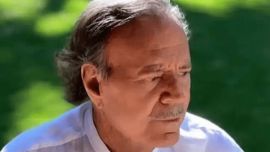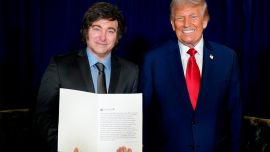D
uring a three-hour interview with presenter/journalist/streamer Alejandro Fantino this week, President Javier Milei said twice that power to him is a zero-sum game. “If I have it, you don’t have it.”
But then we already knew that. Since his days as a TV personality, Milei has been all about a tone of confrontation that, if possible, involves seeing his rivals lose, squirm and suffer.
The underlying question now that he is President is whether this is something he can change, or at least mitigate. If not, it’s likely his political project will not last too long.
Even though he may hate the sound of it, the lessons of the Kirchner dynasty – whose political fadeout is largely responsible for Milei’s meteoric rise to power – could help the President.
Exactly 20 years ago, the late Néstor Kirchner was right where Milei is now. He was seen as a political outsider (although, unlike Milei, he wasn’t) and needed to consolidate his political standing. He did, and the Kirchner era ended up lasting for two decades, even surviving his own death in 2010.
Like Milei, Néstor Kirchner also enjoyed conflict. He built his identity by contrasting it with the previous dominant era, that of Carlos Menem’s neoliberal Peronism. Unlike the current occupant of the Casa Rosada, Kirchner picked the fights – the libertarian is, against the Lincoln axiom, trying to fight all people all of the time.
Néstor Kirchner chose an identity that matched with the spirit of the times to garner political support. He overacted his interest for a liberal agenda (“progressive,” in the Argentine political jargon) to shift the Peronist party away from the conservatism of the Menem era. Milei does not have to forge a political identity because he already has one and it is clearly defined. But he does have to learn how to make it mingle with (at least part of) the rest of the establishment. It’s easy, if he tries.
Kirchner did not play zero-sum games. After he was deprived of a second-round victory, when Menem walked out of the second round, Kirchner ran things under the assumption that he had the support of 22 percent of the people (the tally he took in the first round). Polls showed a larger following, but the 22 percent myth helped him to appear for years as a figure that was always on the rise.
Milei, instead, is governing as if the 55 percent of the people that voted for him in the second round are his base forever. Milei’s opponents – the 44 percent that voted for Sergio Massa in the November run-off – are unlikely to ever like his government, whether it be economic, political, cultural, and personal reasons. Milei does not want them too, either.
It would be wiser for Milei to think of himself as a leader with 30 percent support, representing the votes he got in the first round in October, something that would remind himself every day that the support of the 25 percent that (mostly reluctantly) picked him in the second round cannot be taken for granted. This, in total, is some 6.5 million Argentines, most of them from the urban middle classes.
So, it makes political sense for his administration, as Economy Minister Luis Caputo did this week, to accuse private health companies of having “declared a war on the middle class” with their cartelised price increases, even if the comment does not blend well with the market-resolves-all gospel that Milei preaches. The next obvious question is what could a government that has just deregulated a market by decree do to make it behave. The hunch/feeling answer is nothing.
Back in the days of a world without social media, Kirchner also cherry-picked his fights with the press. He initially had a chummy relationship with Grupo Clarín for business reasons and with the left-leaning Página/12 for agenda reasons; he tussled with La Nación for ideological reasons and Perfil for personal reasons. Milei, however, is turning that logic upside down: he has picked only a handful of friendly journalists as his allies and is drawing up a list of adversaries that includes almost everybody else.
The ultimate comparison between Kirchner and Milei is their thirst for power and full dominance. Afraid of being tagged with early lame duck status, Kirchner skipped re-election and instead nominated his wife, Cristina Fernández de Kirchner, for the nation’s highest office. Milei is already eyeing the midterms in 2025 as a chance to improve his flaccid political muscle, and the libertarian diehards seem to be in the early stages of verbalising a similar succession plan, as deputy Lilia Lemoine suggested this week – not with the president’s girlfriend Fátima Flórez but with the presidential chief-of-staff, his sister Karina Milei.
Allow them the luxury of daydreaming – their journey has only just begun after all. But whatever the plan be, they are unlikely to zero-sum their way to dominance.
* Marcelo J. García is a political analyst and Director for the Americas for the Horizon Engage risk consultancy firm.

























Comments